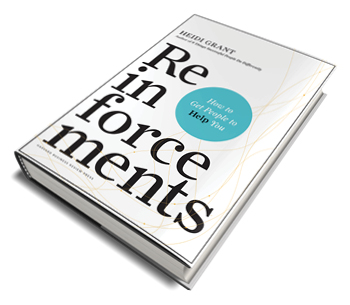To be a better help requestor, look into reinforcements—the small, subtle cues that motivate others to work with us.
By Allan Fallow
 Why is it so unsettling to ask someone for help? Psychologist Stanley Milgram tried to answer that question in his “subway studies” of the 1970s, directing graduate students to board crowded trains beneath New York City and ask strangers to give up their seats.
Why is it so unsettling to ask someone for help? Psychologist Stanley Milgram tried to answer that question in his “subway studies” of the 1970s, directing graduate students to board crowded trains beneath New York City and ask strangers to give up their seats.
Nearly 70% of those who were asked willingly obliged, yet the experience seemed to traumatize the requestors themselves: They felt sick to their stomachs, turned white or nearly fainted. When a skeptical Milgram tried the experiment himself, he reported, “I could feel my face blanching. I actually felt as if I were going to perish.”
That discomfort is something we can all learn to neutralize, writes motivation expert Heidi Grant in Reinforcements, a sprightly read that is the author’s fifth book. For salespeople in particular, Grant has a timely reminder about our reliance on others:
No one succeeds in a vacuum, whether you are in an entry-level position or have a view from the C-suite. Cross-functional teams, agile project-management techniques, and matrixed or hierarchy-minimizing organizational structures mean we’re all collaborating more and having to suffer the small agony of asking people to help us on a regular basis.
Reinforcements abounds with good news about “the small, subtle cues that motivate others to work with us.” Much more than it often seems, Grant writes, human beings are “wired to want to help and support one another.” Yet the book is equally rich in caveats on how not to seek such aid. “Our intuitions about what should make others more likely to help [us] are often dead wrong,” Grant cautions. “Our fumbling, apologetic ways of asking for assistance generally make people far less likely to want to help.”
How can we increase the likelihood of receiving help? Appeal to the potential helper’s identity and self-esteem. Give them a chance to see their assistance “land.” And above all, work on becoming a better perspective taker. As things stand now, writes Grant, aid seekers “seriously underestimate how likely others are to comply with a direct request for help.” We obsess over the imagined burden that a favor request puts on its recipient, discounting the “cost to the potential helper of saying no.”
So despite its bad rep as a sales cliché, Grant’s research reveals that we should never hesitate to “make the ask.” But “don’t make it weird,” she urges us, by flubbing the “tricky” process of requesting help: apologizing profusely, reminding people they “owe you one,” or painting the help you need as some sort of insignificant favor.
Grant may have a Ph.D. and some hifalutin titles, but she comes across as very grounded in spelling out “The Four Steps to Getting the Help You Need”:
1. Someone needs to notice you’re in need.
Thanks to our pesky self-preoccupation—often stemming from conditions known as perceptual load and inattentional blindness—we are bad at recognizing when a fellow human requires aid. When you need support, writes Grant, it’s “far less obvious to the people around you than you think it is.”
2. The helper must believe you need help.
Something called audience inhibition causes others to assume that “if you want help, you will ask for it. They expect you to come to them.” To counter this dynamic, ask for help overtly: some 75%–90% of the assistance that colleagues lend one another in the workplace, Grant’s research shows, occurs in response to direct appeals.
3. The helper needs to “own” the act of helping.
When there are many people who could help in a given situation, it’s unclear to everyone involved who should help. To chase away this ambiguity, ditch the mass appeal in favor of the direct approach: “Help requests that are made face-to-face are the most successful,” writes Grant, “because the discomfort of saying no—the awkwardness and sense that you have violated social norms—increases exponentially. Indirect requests, like those made via email, do not cause discomfort to the same extent.”
4. The helper must be able to furnish the help you seek.
Every potential benefactor you summon the gumption to approach is probably leading a very busy life of his or her own. So take a few steps to facilitate their act of generosity: Make your request explicit (no more vague requests to “meet for coffee”); confine it to a reasonable size (something you know will be within the other’s power to accomplish); and be open to receiving help that may differ from that which you stated (it may prove far more useful than you suspect).
If there’s a surprise in Reinforcements, it’s the predictable one that “perseverance pays.” Those who reject a first request for assistance, it turns out, are in fact more apt to lend a hand the second time around. After one industry notable ignored her request to blurb her first book, for example, Grant quailed at asking him again: If he didn’t help me then, why would he help me now? To her surprise, Mr. Naysayer came through on Grant’s second try, contributing a quote that made her “blush a little from the generosity of its praise.” The episode forced the author to relive many similar instances when she herself had agreed to a second request “to make up for having been too selfish, lazy, or preoccupied to give someone the help they needed the first time.”
Even seeming maverick Steve Jobs recognized the urgency of making your needs known. “Most people never pick up the phone and call, most people never ask,” Jobs mused in a 1994 interview, a few years before he returned to the helm of Apple. “And that’s what separates, sometimes, the people that do things from the people that just dream about them.”








